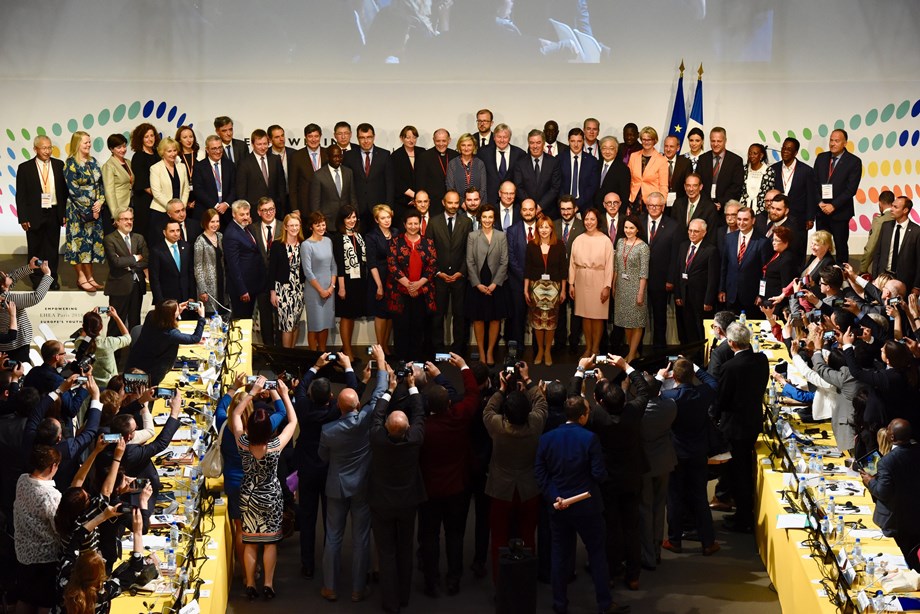Magna Charta and EHEA2018
24 May 2018
The Executive Board Chair Ludovic Thilly participated on 23 May 2018 at the Magna Charta Observatory (MCO) meeting organised at the Maison des universités in cooperation with the CPU, the Conference of French University Rectors: the main topic was “academic integrity and freedom”, values that are at the core of Coimbra Group considerations. Policymakers and Rectors presented recent developments in the field of integrity policy, including the “Guidelines for an institutional Code of Ethics in Higher Education” proposed by the MCO. Four parallel sessions were organised to discuss “Why and how is integrity under threat? What are some effective responses?”, “Developing institutional strategies to safeguard integrity”, “Achieving staff and student support for ensuring integrity “, “What can the MCO do to be helpful in the way of academic integrity?”. The richness of the exchanges can be summarised, first, by the five identified obstacles to academic integrity and freedom: political and financial pressures, non-transparent internationalisation, self-interest of academics and competition; secondly, by the five solutions: education in ethics and integrity, dialogue, values advocacy, responsibility to society and collegiality. A follow-up conference will be organised in Salamanca on 17 and 18 September 2018.
In the evening of 23 May, the EHEA2018 Ministerial Conference was opened in the historical Aula of the Sorbonne University with a celebration of the 20th anniversary of the Sorbonne Joint declaration, with speeches from Stakeholders and the French Minister for Higher Education, Research and Innovation, Frédérique Vidal. On this occasion, the new European Student Card was launched.
The next two days, 24-25 May 2018, where devoted to the EHEA2018 conference itself with declarations from Ministers from the 48 countries involved in the Bologna Process and more than 20 other associated countries. The debate included statements on the inclusive role of education and the need to strengthen the European Education Area. On this occasion, the European “Higher Education Area in 2018: Bologna Process Implementation Report” was presented with very interesting indicators on the implementation of the Bologna Process. On 25 May 2018, the Paris Communiqué was adopted, proposing guidelines for the next steps of the Bologna Process. These include:
- In order to unlock the full potential of the EHEA and ensure the implementation of key Bologna Process commitments, [we are] adopting a structured peer support approach based on solidarity, cooperation and mutual learning. In 2018-2020, thematic peer groups will focus on three key commitments crucial to reinforcing and supporting quality and cooperation inside the EHEA: a three-cycle system compatible with the overarching framework of qualifications of the EHEA and first and second cycle degrees scaled by ECTS, compliance with the Lisbon Recognition Convention, quality assurance in compliance with the Standards and Guidelines for Quality Assurance in the European Higher Education Area.
- [We] mandate the Bologna follow-up group (BFUG) to implement, coordinate and monitor the adopted peer support approach, and to do so with the aid of the Bologna Implementation Coordination Group established to that end. It will analyse the first round of peer support and through the BFUG suggest the direction that the activity should take in the future, and report back to us at our next EHEA Ministerial conference in 2020.
- [We] commit to developing new and inclusive approaches for continuous enhancement of learning and teaching across the EHEA, and can succeed only if we do so in close collaboration with the European higher education community, in full respect of academic freedom and institutional autonomy.
- [We will] support higher education institutions to develop and enhance their strategies for learning and teaching. We also encourage them to provide inter-disciplinary programmes as well as to combine academic and work-based learning. Students should encounter research or activities linked to research and innovation at all levels of higher education to develop the critical and creative mind-sets which will enable them to find novel solutions to emerging challenges. In this regard, we commit to improving synergies between education, research and innovation.
- [We will] foster and extend integrated transnational cooperation in higher education, research and innovation, for increased mobility of staff, students and researchers, and for more joint study programmes throughout the whole EHEA. We take note with interest of the recent EU initiative on ‘European Universities’ and we will encourage all our higher education institutions to work in such new settings. We call on the BFUG to establish interaction with the European Research Area and Innovation Committee (ERAC) by 2020 in order to develop synergies between the EHEA and the European Research Area (ERA).
At the end of the conference, the Head of the BFUG secretariat handed over the responsibility for the implementation of the Paris Communiqué guidelines and the organisation of the next EHEA Ministerial conference in Rome in 2020 to Italy.
The Executive Board of the Coimbra Group is pleased to see that most of the recommendations proposed after a consultation with the Rectors’ Advisory Group and Rectors from our member universities, have been taken into account by the BFUG.


